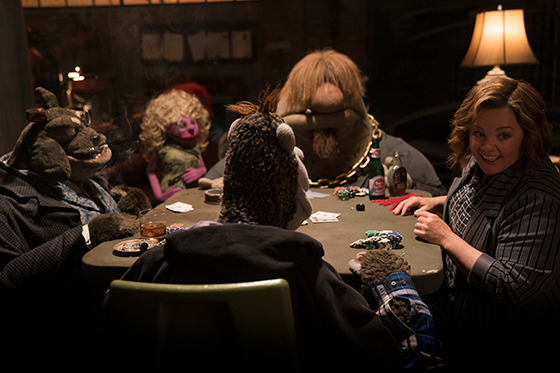The Happytime Murders
This crude and tasteless crime saga featuring humans and puppets comes from director Brian Henson, whose late father was the architect behind the beloved Muppets.

Melissa McCarthy in THE HAPPYTIME MURDERS.

It’s difficult to tell whether The Happytime Murders is merely an innocent miscalculation or the product of some deeper rooted family vendetta.
This crude and tasteless crime saga featuring humans and puppets comes from director Brian Henson, whose late father was the architect behind the beloved Muppets. And while it might be distressing to see Muppet-like characters engaging in various forms of perversion and debauchery, what’s worse is the absence of wit and charm that make Jim Henson’s creations so memorable and enduring.
So if you stumble into this unfunny concoction, it’s best to clear your conscience of any fond Muppet memories beforehand. Thankfully, none of our favorites show up here to stain their reputation.
The story takes place in a crime-ridden Los Angeles where humans coexist with blue cloth-skinned puppets, with the latter feeling inferior and marginalized. Phil (voiced by Muppets veteran Bill Barretta) is a chain-smoking ex-cop working as a private investigator when he stumbles upon a serial-killer plot targeting the washed-up stars of a 1980s children’s television show that happened to star Phil’s human ex (Elizabeth Banks) and his estranged puppet brother, among others.
Phil’s attempt to solve the crime is complicated by the involvement of Connie (Melissa McCarthy), his former partner on the police force. The two split up on bad terms, and bickering ensues as the body count escalates.
Perhaps it’s unfair, if inevitable, to use legacy as a method for scrutinizing The Happytime Murders. After all, puppets don’t have to be restricted to stories that are uplifting or family-friendly — this spoof is certainly neither of those things.
In this case, despite some commendable puppeteering, the problems for Henson (Muppet Treasure Island) lie more with the pedestrian execution of a threadbare concept. The screenplay doesn’t offer any meaningful subversive or satirical value, its human characters are unimaginative, and its central noir-style murder mystery never gains any steam.
The film seems to exist only for shock value, meant to elicit gasps and push the envelope in terms of expected puppet behavior. They’re profane, they’re uninhibited, they’re depraved — but for what purpose? Once that over-the-top effect wears off, things turn tedious in a hurry.
To see this sort of idea executed well, revisit Peter Jackson’s hilariously outrageous Meet the Feebles (1989) or even the animated Team America: World Police (2004). By comparison, Happytime is pretty sad.
Rated R, 91 minutes.